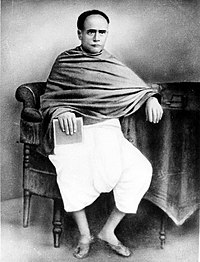Ishwar Chandra Vidyasagar
| Ishwar Chandra Vidyasagar | |
|---|---|

Ishwar Chandra Vidyasagar
|
|
| Native name | ঈশ্বরচন্দ্র বিদ্যাসাগর |
| Born | Ishwar Chandra Bandopadhyay 26 September 1820 Birsingha Village, Bengal Presidency, India (now in Paschim Medinipur, West Bengal, India) |
| Died | 29 July 1891 (aged 70) North Calcutta, Bengal Presidency, British India (now Kolkata, West Bengal, India) |
| Occupation | Writer, reformer, lecturer |
| Language | Bengali |
| Nationality | Indian |
| Citizenship | British India |
| Education | Sanskrit College, (1829–1839) |
| Genre | Philosopher, academic, educator, translator, Printer, publisher, entrepreneur, , Philanthropist |
| Literary movement | Bengal Renaissance |
| Spouse | Dinamani Devi |
| Children | Narayan Chandra Bandyopadhyaya |
Ishwar Chandra Vidyasagar CIE (26 September 1820 – 29 July 1891), born Ishwar Chandra Bandyopadhyay (Ishshor Chôndro Bôndopaddhae), was an Indian Bengali polymath and a key figure of the Bengal Renaissance. He was a philosopher, academic educator, writer, translator, printer, publisher, entrepreneur, reformer and philanthropist. His efforts to simplify and modernize Bengali prose were significant. He also rationalized and simplified the Bengali alphabet and type, which had remained unchanged since Charles Wilkins and Panchanan Karmakar had cut the first (wooden) Bengali type in 1780.
He received the title "Vidyasagar" (in Sanskrit vidya means knowledge and sagar means ocean, i.e., Ocean of Knowledge) from Sanskrit College, Calcutta (from where he graduated), due to his excellent performance in Sanskrit studies and philosophy. Noted Bengali mathematician Anil Kumar Gain founded Vidyasagar University, named in his honour.
Ishwar Chandra Vidyasagar was born in a Hindu Brahmin family to Thakurdas Bandyopadhyay and Bhagavati Devi at Birsingha village in the Ghatal subdivision of Paschim Midnapore District on 26 September 1820. At the age of 6, he went to Calcutta and started living in Bhagabat Charan's house in Burrabazar, where Thakurdas had already been staying for some years. Ishwar felt at ease amidst Bhagabat's large family and settled down comfortably in no time. Bhagabat's youngest daughter Raimoni's motherly and affectionate feelings towards Ishwar touched him deeply and had a strong influence on his later revolutionary work towards the upliftment of women's status in India.
...
Wikipedia
